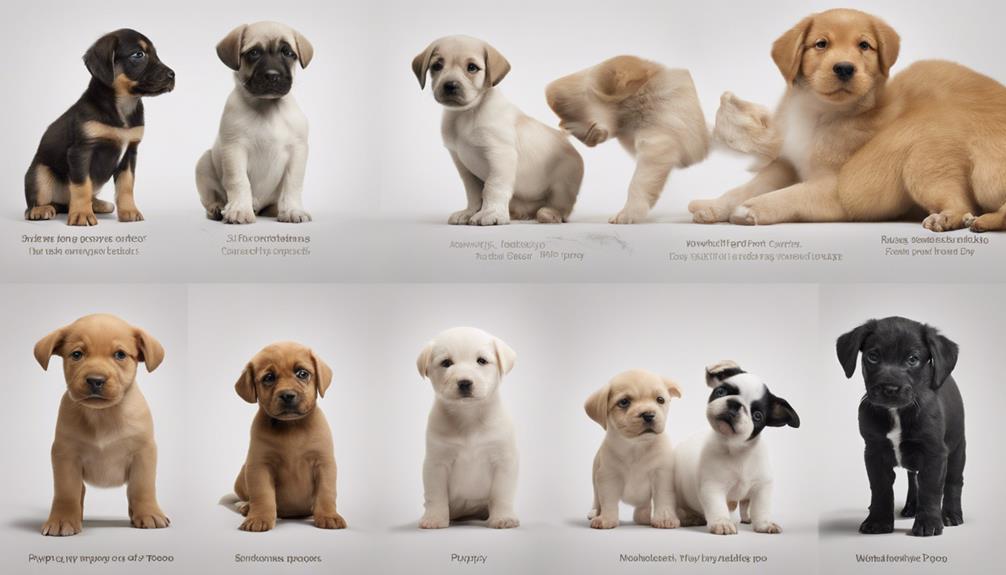As we observed our newborn puppy's poop resemble a soft-serve swirl ice cream cone, we were reminded of the intricate details that can be gleaned from something seemingly routine.
Understanding the nuances of newborn puppy poop can provide valuable insights into their health and well-being. From deciphering colors to evaluating consistency, each element tells a story about your furry friend's internal state.
Stay tuned to uncover the secrets behind newborn puppy poop and discover how this detailed guide can aid you in maneuvering the world of puppy parenthood.
Key Takeaways
- Monitoring color variations and consistency aids in early detection of health issues.
- Regular poop frequency and timing after meals are indicators of a healthy digestive system.
- Abnormal colors like black, red, or white signal potential health concerns.
- Prompt veterinary attention is crucial for any concerning changes in poop appearance or consistency.
Understanding Newborn Puppy Poop Colors
When observing newborn puppy poop colors, it's important to note the initial appearance of meconium, which is typically black or dark green and sticky.
As newborn puppies start shifting to solid food, their poop can change to a light brown or dark yellow hue. This alteration occurs within the first three stools produced after the introduction of solid food. The change in color is due to the digestive system processing the new nutrients. The dark yellow color is a normal progression as the puppies' digestive system adapts to the dietary shift.
Understanding the reasons behind these color changes is essential for monitoring the puppies' digestive health. By observing the color variations in their poop, pet owners can gain valuable insights into the puppies' well-being and detect any potential issues early on. Monitoring these color changes can help pet owners confirm their newborn puppies are healthy and thriving.
Analyzing Newborn Puppy Poop Consistency

Analyzing the consistency of newborn puppy poop is essential for evaluating their digestive health and overall well-being. When puppies are born, they pass a substance called meconium, which is dark green and sticky. As they shift to solid foods, their stool color changes to light brown or dark yellow. Monitoring these changes in stool color and consistency is critical.
Any abnormal stool consistency or unusual colors should be promptly addressed with a veterinarian. Staying vigilant and monitoring your newborn puppy's poop can guarantee they're on the right track to a healthy and happy life. Regularly observing and noting changes in poop consistency can help in detecting potential health issues early on.
Monitoring Newborn Puppy Poop Frequency
To confirm the well-being of your newborn puppy, it's important to monitor their poop frequency regularly. Keeping track of how often your puppy eliminates waste can provide valuable insights into their digestive system health. Here are some key points to take note of when monitoring your newborn puppy's poop frequency:
- Frequency Matters: Newborn puppies typically poop several times a day, so keep an eye on how often they're relieving themselves.
- Digestive System Regulation: Pay attention to the timing of their poops, as puppies often eliminate about 30 minutes after eating until they're around 4 months old.
- The Meconium Stage: Remember that the first poop in newborn puppies is called meconium, which is dark in color and sticky in texture.
- Color and Consistency: Healthy newborn puppy poop should be light brown or dark yellow, indicating proper digestion.
- Shift to Solids: As puppies start consuming solid food, their stool may darken and become more solid in consistency.
Identifying Warning Signs in Newborn Puppy Poop

Identifying warning signs in newborn puppy poop requires keen observation and an understanding of what is considered normal for their digestive health. When examining your newborn puppy's poop, pay close attention to the color and consistency as these can indicate potential health issues. Here is a helpful guide to interpreting warning signs in newborn puppy poop:
| Aspect | Normal | Warning Signs |
|---|---|---|
| Color | Light brown or dark yellow | Black, red, or white colors |
| Consistency | Resembles toothpaste & easy to clean up | Watery or runny stool |
| Health Issues | Indicates good digestive health | May lead to dehydration quickly |
Managing Newborn Puppy Poop Issues
When managing issues related to newborn puppy poop, it's essential to closely monitor their stools for any changes in color, consistency, or frequency.
Here are some key points to keep in mind:
- Newborn puppies: Understanding the normal development of a puppy's digestive system is important for managing poop-related issues effectively.
- Poop frequency: Keeping track of how often your puppy poops can help you detect any irregularities early on.
- Meconium: Recognizing the appearance of meconium in a puppy's first poop is vital as it indicates the proper functioning of their digestive system.
- Stool color: Changes in stool color can signal potential health issues, so being observant of color variations is essential.
- Veterinary advice: If you notice any concerning changes in your puppy's poop, seeking prompt veterinary advice is crucial to address any underlying problems efficiently.
Frequently Asked Questions
What Is a Healthy Poop for a Newborn Puppy?
For a newborn puppy, healthy poop appears as light brown or dark yellow. Multiple daily bowel movements are typical, with the first one being black or dark green meconium. Monitoring poop color and frequency is crucial for their well-being.
How Do You Clean Newborn Puppy Poop?
When cleaning newborn puppy poop, we gently use a warm, damp cloth to wipe away messes. Care around the genital area is essential to prevent irritation. Proper disposal and thorough cleaning help maintain hygiene and prevent infections.
How Long to Stimulate Newborn Puppy to Poop?
We stimulate newborn puppies to poop for about 30 seconds post-feeding. This routine aids digestion and prevents constipation. Consistent and gentle stimulation helps establish healthy bathroom habits until puppies gain control of their bowels around 3-4 weeks old.
What Not to Do With Newborn Puppies?
When caring for newborn puppies, we must avoid rough handling, overfeeding, harsh chemicals, leaving them unattended, or delaying vet visits for symptoms. Prioritizing their safety and health is essential in nurturing these delicate beings.
Conclusion
In summary, caring for newborn puppy poop is vital for their health and well-being. By understanding the colors, consistency, and frequency of their poop, puppy owners can monitor their puppy's health effectively.
Remember, a healthy poop means a healthy puppy! Just like a colorful rainbow in the sky, a clean and well-formed poop indicates a happy and thriving furry friend.
Stay vigilant and proactive in managing any poop issues to guarantee your puppy's happiness and comfort.









